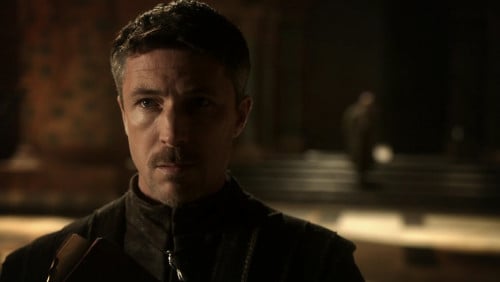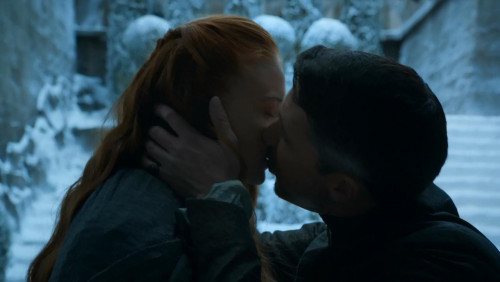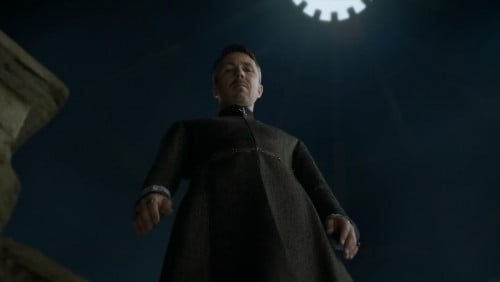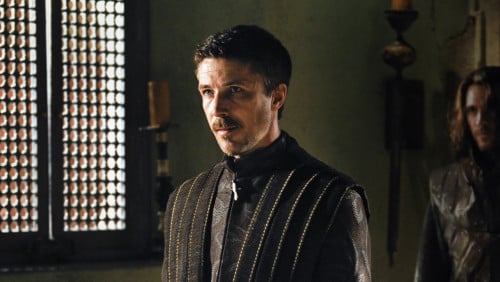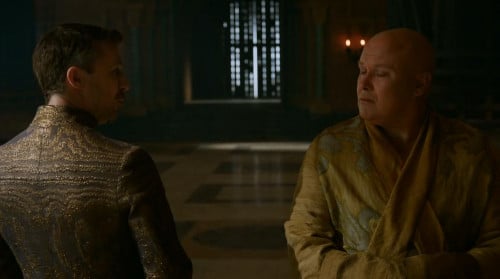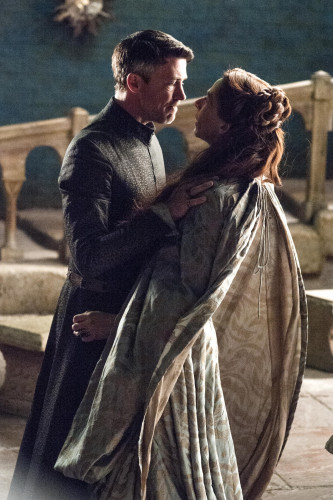One of the actors who has been most elusive among the regular cast has been Aidan Gillen. We’ve hoped to interview him for a number of years, but could never make it work… until, that is, earlier this year when I traveled to London to take part in a round of interviews with Gillen, as well as a number of actors.
I recall back when the show was announced that all sorts of names flew about for various roles, but Gillen’s name was easily the most common fan suggestion for Petyr Baelish. Those suggestions were largely based on his role as Carcetti in HBO’s groundbreaking The Wire, I suspect, but I admit at the time I hadn’t gotten past the show’s first season so didn’t know him from there. But we here at Westeros.org also latched onto the name when it was suggested, because of his charming, fearless, devilish performance as Stuart Russel T. Davies’s Queer as Folk.
With many notable roles under his belt, in film, television, and theater, the Dublin-born actor proves a very knowledgeable, extremely thoughtful interview subject. He takes his time with all his responses, thinking them through. And, as you’ll see, he’s more familiar than most of the actors with the source material….
Interview
Without being too spoilery, what sort of character does Littlefinger takes this season?
Literally a journey. At the end of season 3, I got a ship and sailed off. So I go to the Eyrie, and I don’t think that’s a secret. In terms of character development, what’s starting to happen is that I’m taking my surrogate parental responsibilities a bit more seriously, taking Sansa under my wings a bit and making sure Robin Arryn is okay. That’s mainly it.
The Eyrie’s a big destination. Robin needs guidance—he’s only 10 years old—and there’s an interesting dynamic with Sansa as well.
How much do you know about what lies ahead for your character? You’ve read the books, I know, but do you know what lies beyond that?
I know as much as anyone whose read the books, or we’re about to. Anything after that… I don’t know, really.
Why do you like to read the books?
Why? I didn’t say I like to, I just said I read them.
[Elio: Didn’t pursue this further, but for those who wonder at his tone, I think Aidan was quite serious when he answered—they’re not really his cup of tea. But it’s impressive that he carried on with them to better grasp the story, and he certainly understands why so many people do enjoy them.]
I don’t know if actors need to read them, but I felt that I could get a lot of character information from the books, so that’s the obvious reason. Also, not knowing what the end game is can be interesting for some actors, so maybe not reading the next book is okay—so you don’t play something a certain way just because you know some event happens in book 5. Not knowing what’s going to happen after this latest book does offer a special element.
It’s an adventure doing it, really. To me, anyways. This is what being an actor should be about. You’re going to these places—Malta, Croatia, Iceland, Northern Ireland—and not knowing what’s going to happen next adds something to that.
Which character had the most astonishing development from your point of view?
There’s an interesting new character, the Red Viper, Prince Oberyn Martell. That’s a character I’m quite taken by. The thing about Game of Thrones, which you know, is that characters will change from season to season. So a character like Jaime Lannister isn’t as despicable as when he started out, but there’s always the chance he may be despicable later. There’s always twists and turns.
I couldn’t say anyone really stands out for me as having taken a massive turn, one way or another. I’m quite interested in Cersei, I’m most fascinated by her. It’s about the character’s subtlety, the things she has to deal with, the way Lena Headey plays her.
The craft of acting is something I’m interested in, because it’s not just delivering lines—it’s doing it a certain way, it’s body language, it’s all these other things. Many fans noticed that between the first and second seasons, your delivery for Littlefinger seemed to change. Could you explain the process that led to that?
I did actually think about that—first, I’m not saying it’s the right or wrong thing to do—but I did feel like that as it went on I needed to loosen up a little. In this current season, that whole “chaos is a ladder thing from last season, it shows that Littlefinger is at his most calm and comfortable and himself when things are chaotic. That’s when he’s in his element. So with the chaos, uncertainty—things like the Red Wedding at the end of last season—he’s coming into his own and relaxing into it, approaching other ways to persuade people.
He’s always thinking almost a generation ahead.
You’ve been in two milestones of TV, both The Wire and Game of Thrones. Did you anticipate its success, and why do you think it is successful?
It’s successful because of its scope—its huge. It’s not necessarily a recipe for success, but the fact that it’s a fantasy series rooted in human experience and big, human themes—family, war, revenge, love, death—and has a devotion to bringing all these characters from the books who are so well written to life, in as much detail as they can. Obviously, you can’t fit everything in, because there’s so many hours on the TV.
But its commitment to maintaining several parallel story lines over such a long period of time—many of which have not dovetailed yet; you can imagine most TV producers might not trust viewers to wait so long, so they’d rush things and that’s a lot less interesting in the way to go about. That brings us back to The Wire, which played a long-game, where it might take five seasons for a story to make sense.
Besides being a spectacle, Game of Thrones has been groundbreaking in two ways. One, with the death of Ned Stark in series 1, you realize that anything can happen, that it’s a brutal world and that characters won’t necessarily survive just because they’re a lead character. It’s a fantasy world, but it’s inspired by real historical events like the Wars of the Roses, and people die, they have their siblings beheaded.
The other ground-breaking element, even more so than The Wire, is the parallel storylines that stay separated for so long. And also, we’re mirroring the books, so there’s only a certain amount of liberties we can take. But they do have to take them as well, because there’s sometimes a sense a character disappears too long from the story, and that doesn’t necessarily work as well on television. They’ve played it as close to the books for as long as they could, which I think is admirable.
Your character is a Machiavellian monster. Do you have any models for how you perform the role?
Yeah. Actually, the first thing I read after getting the role was The Prince. I’m not overdoing it—I would study that stuff anyway—but you get inspiration from everywhere, by reading the books, by reading The Prince. Or by the look of the character. When you get a part, you sometimes collaborate a bit with the production about the look of the character. And in the case of Littlefinger, he’s a bit inspired by Peter Mandelson, the British politician who’s known as “The Prince of Darkness”. So I had a picture of him, and when I went to hair and makeup I asked if I could look at that. I explained—to those who needed it explained—who Mandelson was, and what he was like or what he was portrayed like, and so they signed off on it.
Carcetti from The Wire and Baelish from Game of Thrones seem quite connected.
Yeah, because they’re both politicians.
What attracted you to playing these characters?
The Littlefinger casting may have had something to do with my earlier role in The Wire. They’re both players of dubious morality. Though Carcetti, interestingly, did develop some backbone as the series continued. Littlefinger might take some interesting turns, too.
Carcetti, though, at the time I had been in a play in New York—a Harold Pinter play called The Caretaker—which was nothing at all like Carcetti, but it got me noticed. Carcetti was loosely based on a real-life figure, an Irish-American, who was the mayor in Baltimore. So we’ll call him Italian instead, and we’ll get an Irish bloke who’s playing a London guy in a play in New York to throw a smoke screen over it.
I just played another politician, actually, in a massive four hour television program in Ireland. A man called Charles Haughey, who ran the country on-and-off. That’s been interesting. I never thought that I’d play a politician in my life, actually. When I first showed up in Baltimore to play Carcetti, some of the crew were looking at me and thinking I was surely the wrong person for it. My hair was long, my fingernails were blue at the time…
Does Petyr Baelish have a fatal flaw, do you think?
Probably, yeah.
It’s nothing too nasty. It’s the obvious weakness: he feels too much about certain people, and that’s something that Littlefinger has to watch out for.
I’ve always seem him as something of an Iago, who’s driven by jealousy about what others have in life. Is the climb up that ladder partly to look down at those people who used to look down on him?
I don’t think it’s to look down at them. There was humiliation—the humiliation of being almost killed by Brandon Stark, of being rejected by Catelyn—and those particular rejections, as well as his more humble, meager backgrounds are definitely a driving force in his life. But it’s not to look down on people, I think, it’s just the security of being able to be in a position where he can never be hurt again.
Who have you enjoyed working with the most in the cast? I’ve always enjoyed the verbal sparring you get to do with various characters.
Obviously, the scenes with Varys, played by Conleth Hill. I’ve watched Conleth in a few things over the years, and he’s a great actor, he’s funny, clever, and quick. And I’ve enjoyed—as the seasons have gone on—moving into different worlds. I got a scene or two with Charles Dance, and I look forward to being able to move around and interact with other actors.
Mainly Conleth… but I have enjoyed working with the girls as well, like the scene with Arya and Sansa at the joust in the first season. Because there’s a gentle side to Petyr, as well, it’s not always his being devious. I do hope, ultimately, to have some scenes with more characters from other story lines but I’m not sure how that’s going to go.
Does Littlefinger have a secret agenda that needs to stay hidden from everyone?
Yes, but if anyone sees it, it’s game over for him. Petyr doesn’t have any trusted companions, he never cultivated any, because they’ll fail you and that’s the way out. So he keeps his cards close to his chest all the time. Though… I suppose it’s fair to say he’s trying to cultivate a closer relationship to Robin Arryn and Sansa.
Some trust may develop there. But that’s about it. They’re people who are much younger, who don’t seem to have agendas of their own—though they probably do have them, because you have to by the time you’re 8 years old in that world!
Your character is certainly more important to the story than he might seem at first. Do you agree with that?
Yeah. Yeah, sure. The Iago comparison you made earlier—that’s another one, another obvious comparison, and I’m sure it was in George’s mind as well when he wrote the character—fits here, because like Iago, Littlefinger pulls a lot of strings without characters realizing what he’s doing. He has a lot of influence that’s not obvious.
One last question, can I ask about the Lysa Arryn relationship, as that’s important?
It’s good. It’s great. It’s interesting, that. Last season I filmed a scene with her that wasn’t used… It was a scene that was written and which we didn’t use. So we had done this scene, and then when we came back, we started over and did a similar type of scene where the context had changed.
I’m glad we went back, that we had the resources to do that, because it was too big of a deal to tag onto the end of something else. That was a strong decision to make, to shoot a scene and then to decide to drop it and do it again later. I also did enjoy working with Kate Dickie a lot.
Posted at 20:28 CET by Elio
Tags:
Interviews |
PermaLink
